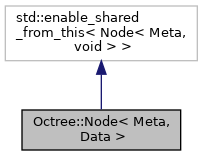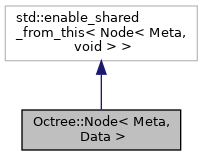Octree class without anything special (this uses full tree representation rather than linear/pointerless). More...
#include <EBGeometry_Octree.hpp>


Public Types | |
| using | StopFunction = std::function< bool(const Node< Meta, Data > &a_node)> |
| Function for deciding whether or not to split a node. | |
| using | MetaConstructor = std::function< Meta(const OctantIndex &a_index, const Meta &a_parentMeta)> |
| For assigning meta-data to the child octs during the build process. | |
| using | DataConstructor = std::function< std::shared_ptr< Data >(const OctantIndex &a_index, const std::shared_ptr< Data > &a_parentData)> |
| For assigning data to child octs during the build process. | |
| using | Updater = std::function< void(const Node< Meta, Data > &a_node)> |
| Updater pattern for Node::traverse. This is called when visiting a leaf node. | |
| using | Visiter = std::function< bool(const Node< Meta, Data > &a_node)> |
| Visiter pattern for Node::traverse. This is called on interior and leaf nodes. Must return true if we should query the node and false otherwise. | |
| using | Sorter = std::function< void(std::array< std::shared_ptr< const Node< Meta, Data > >, 8 > &a_children)> |
| Sorter for traverse pattern. This is called on interior nodes for deciding which sub-tree to visit first. | |
Public Member Functions | |
| Node () | |
| Default constructor. | |
| virtual | ~Node () |
| Destructor. | |
| const std::array< std::shared_ptr< Node< Meta, Data > >, 8 > & | getChildren () const noexcept |
| Get children. | |
| std::array< std::shared_ptr< Node< Meta, Data > >, 8 > & | getChildren () noexcept |
| Get children. | |
| Meta & | getMetaData () noexcept |
| Get node meta-data. | |
| const Meta & | getMetaData () const noexcept |
| Get node meta-data. | |
| std::shared_ptr< Data > & | getData () noexcept |
| Get node data. | |
| const std::shared_ptr< Data > & | getData () const noexcept |
| Get node data. | |
| bool | isLeaf () const noexcept |
| Check if this is a leaf node. | |
| void | buildDepthFirst (const StopFunction &a_stopFunction, const MetaConstructor &a_metaConstructor, const DataConstructor &a_dataConstructor) noexcept |
| Build the octree in depth-first order. User decides if the node should be split, and how to split it. | |
| void | buildBreadthFirst (const StopFunction &a_stopFunction, const MetaConstructor &a_metaConstructor, const DataConstructor &a_dataConstructor) noexcept |
| Build the octree in breadth-first order. User decides if the node should be split, and how to split it. | |
| void | traverse (const Updater &a_updater, const Visiter &a_visiter, const Sorter &a_sorter=[](std::array< std::shared_ptr< const Node< Meta, Data > >, 8 > &a_children) -> void { return;}) const noexcept |
| Traverse the tree. | |
Protected Attributes | |
| Meta | m_meta |
| Meta-data for the node. This is typically the lower-left and upper-right corners of the node, but it's the users' responsibility to fill this with the meta-information they need for the tree. | |
| std::shared_ptr< Data > | m_data |
| Node contents. | |
| std::array< std::shared_ptr< Node< Meta, Data > >, 8 > | m_children |
| Node children. | |
Detailed Description
Octree class without anything special (this uses full tree representation rather than linear/pointerless).
Meta is the meta-data for the node (user can put in e.g. level, volume, etc) and Data is the leaf node contents.
Member Typedef Documentation
◆ DataConstructor
| using Octree::Node< Meta, Data >::DataConstructor = std::function<std::shared_ptr<Data>(const OctantIndex& a_index, const std::shared_ptr<Data>& a_parentData)> |
For assigning data to child octs during the build process.
- Parameters
-
[in] a_index Octant index [in] a_parentData Parent data.
◆ MetaConstructor
| using Octree::Node< Meta, Data >::MetaConstructor = std::function<Meta(const OctantIndex& a_index, const Meta& a_parentMeta)> |
For assigning meta-data to the child octs during the build process.
- Parameters
-
[in] a_index Octant index [in] a_parentMeta Parent meta data
◆ Sorter
| using Octree::Node< Meta, Data >::Sorter = std::function<void(std::array<std::shared_ptr<const Node<Meta, Data> >, 8>& a_children)> |
Sorter for traverse pattern. This is called on interior nodes for deciding which sub-tree to visit first.
- Parameters
-
[in,out] a_children Sortable children nodes, first node is visited first, then the second, etc.
◆ StopFunction
| using Octree::Node< Meta, Data >::StopFunction = std::function<bool(const Node<Meta, Data>& a_node)> |
Function for deciding whether or not to split a node.
This is called on leaf nodes – if the function returns true the node will be split.
- Parameters
-
[in] a_node Node to split.
◆ Updater
Updater pattern for Node::traverse. This is called when visiting a leaf node.
- Parameters
-
[in] a_node Leaf node that is visited.
◆ Visiter
Visiter pattern for Node::traverse. This is called on interior and leaf nodes. Must return true if we should query the node and false otherwise.
- Parameters
-
[in] a_node Node to visit or not.
Member Function Documentation
◆ buildBreadthFirst()
|
inlinenoexcept |
Build the octree in breadth-first order. User decides if the node should be split, and how to split it.
- Parameters
-
[in] a_stopFunction Function for deciding whether or not to split a node. [in] a_metaConstructor Constructor for node meta-data [in] a_dataConstructor Constructor for node data
◆ buildDepthFirst()
|
inlinenoexcept |
Build the octree in depth-first order. User decides if the node should be split, and how to split it.
- Parameters
-
[in] a_stopFunction Function for deciding whether or not to split a node. [in] a_metaConstructor Constructor for node meta-data [in] a_dataConstructor Constructor for node data
◆ getChildren() [1/2]
|
inlinenoexcept |
Get children.
- Returns
- m_children
◆ getChildren() [2/2]
|
inlinenoexcept |
Get children.
- Returns
- m_children
◆ getData() [1/2]
|
inlinenoexcept |
Get node data.
- Returns
- m_data
◆ getData() [2/2]
|
inlinenoexcept |
Get node data.
- Returns
- m_data
◆ getMetaData() [1/2]
|
inlinenoexcept |
Get node meta-data.
- Returns
- m_meta
◆ getMetaData() [2/2]
|
inlinenoexcept |
Get node meta-data.
- Returns
- m_meta
◆ traverse()
|
inlinenoexcept |
Traverse the tree.
- Parameters
-
[in] a_updater Updater when visiting leaf nodes. [in] a_visiter Visiter for deciding to visit a node. [in] a_sorter Sorter method for deciding which subtree to investigate first.
The documentation for this class was generated from the following file:
- /home/runner/work/EBGeometry/EBGeometry/Source/EBGeometry_Octree.hpp